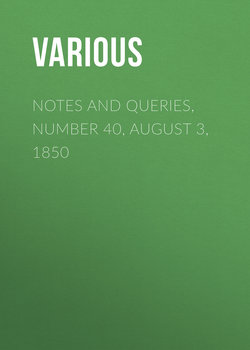Читать книгу Notes and Queries, Number 40, August 3, 1850 - Various - Страница 4
NOTES
NOTES ON MILTON
Оглавление(Continued from Vol. ii., p. 115)
Comus.
On l. 8. (G.):—
"After life's fitful fever he sleeps well."
Macbeth, iii. 2.
On l. 101. (M.):—
"The bridegroom Sunne, who late the Earth had spoused,
Leaves his star-chamber; early in the East
He shook his sparkling locks."
Fletcher's Purple Island C. ix. St. 1.
On l. 102. (M.):—
"And welcome him and his with joy and feast."
Fairfax's Tasso, B. i. St. 77.
On l. 155. (D.):—
"For if the sun's bright beams do blear the sight
Of such as fix'dly gaze against his light."
Sylvester's Du Bartas. Week i. Day 1.
On l. 162. (G.):—
"Such reasons seeming plausible."
Warners Albion's England, p. 155. ed. 1612.
On l. 166. (G.):—
"We are a few of those collected here
That ruder tongues distinguish villager."
Beaumont and Fletcher's Two Noble Kinsmen, iii. 5.
On l. 215. (G.) "Unblemished" was originally (Trin. Coll. Cam. MSS.) written "unspotted," perhaps from Drayton:—
"Whose form unspotted chastity may take,"
On l. 254. (G.) Add to Mr. Warton's note, that after the creation of Sir Robert Dudley to be Earl of Leicester by Queen Elizabeth in 1564, "He sat at dinner in his kirtle." So says Stow in Annals, p. 658. edit. 1633.
On l. 290. (G.):—
"My wrinckl'd face,
Grown smooth as Hebe's."
Randolph's Aristippus, p. 18. 4to. ed. 1630.
On l. 297. (G.):—
"Of frame more than celestial."
Fletcher's Purple Island, C. 6. S. 28. p. 71. ed. 1633.
On l. 331. (G.):—
"Night begins to muffle up the day."
Wither's Mistresse of Philarete.
On l. 335. (G.):—
"That whiles thick darkness blots the light,
My thoughts may cast another night:
In which double shade," &c.
Cartwright's Poems, p. 220. ed. 1651.
On l. 345. (G.):—
"Singing to the sounds of oaten reed."
Drummond, p. 128.
On l. 373. (G.):—
"Virtue gives herself light thro' darkness for to wade."
Spenser's F. Queene.
(D.) For what is here finely said, and again beautifully expressed (v. 381.), we may perhaps refer to Ariosto's description of the gems which form the walls of the castle of Logistilla, or Reason:—
"Che chi l'ha, ovunque sia, sempre che vuole,
Febo (mal grado tuo) si può far giorno."
Orl. Fur. x. 60.
On l. 404. (G.):—
"Whiles a puft and rechlesse libertine,
Himselfe the primrose path of dalliance treads,
And reakes not his owne reed."
Hamlet> i. 3.
On l. 405. (G.):—
"Where death and danger dog the heels of worth."
All's Well that ends Well, iii. 4.
On l. 421. (M.):—
"Thrice is he armed that hath his quarrel just:
And he but naked, though locked up in steel,
Whose conscience with injustice is corrupted."
2 Henry IV., iii. 2.
On l. 424. (G.):—
"And now he treads th' infamous woods and downs."
Ph. Fletcher's Eclog., i. p. 4. ed. 1633.
On l. 494. (G.) The same sort of compliment occurs in Wither's Sheperd's Hunting. (See Gentleman's Mag. for December 1800, p. 1151.)
"Thou wert wont to charm thy flocks;
And among the massy rocks
Hast so cheered me with thy song,
That I have forgot my wrong."
He adds:—
"Hath some churle done thee a spight?
Dost thou miss a lamb to-night?"
Juvenilia, p. 417. ed. 12mo. 1633.
On l. 535. (M.):—
"Not powerful Circe with her Hecate rites."
Ph. Fletcher's Poetical Miscellanies, p. 65. ed. 1633.
On l. 544. (D.):—
"The soft sweet moss shall be thy bed
With crawling woodbine overspread."
Herrick's Hesperides, p. 223.
On l. 554 (G.):—
"And flattery to his sinne close curtain draws."
Ph. Fletcher's Purple Island, p. 112. ed. 1633.
On l. 635. (G.):—
"His clouted shoon were nailed for fear of wasting."
Ph. Fletcher's Purple Island, p. 113.
On l. 707. (G.) A passage in the Spanish Tragedy confirms Mr. Warton's reasoning—
"After them doth Hymen hie as fast,
Clothed in sable and a saffron robe."
Old Plays, vol. iii. p. 214. ed. 1780.
On l. 734. (G.):—
"Saw you not a lady come this way on a sable horse
studded with stars of white?"
Beaumont and Fletcher's Philaster, Act iv.
On l. 752. (G.):—
"A sweet vermilian tincture stained
The bride's fair cheek."
Quarles' Argalus and Parthenia, p. 118. ed. 1647.
On l. 812. (G.):—
"Bathed in worldly bliss."
Drayton, p. 586. ed. 1753.
"The fortunate who bathe in floods of joys."
E. of Sterline's Works, p. 251. ed. 1637.
On l. 834. (D.):—
"The lily-wristed morn."
The Country Life, Herrick's Hesperides, p. 269.
(G.):—
"Reacht him her ivory hand."
Ph. Fletcher's Purple Island, p. 117.
On l. 853. (G.) Compare this line of Drayton in his Baron's Warrs:—
"Of gloomy magicks and benumbing charms."
Vol. i. p. 110. ed. 1753.
On l. 861. (G.):—
"Through whose translucent sides much light is born."
Ph. Fletcher's Pur. Island, C. 5. St. 31. p. 54.
On l. 862. (M.):—
"All hundred nymphs, that in his rivers dwell,
About him flock, with water-lilies crowned."
Ph. Fletcher's Poet. Miscell., p 67. ed. 1633.
On l. 863. (G.) The use of Ambergris, mentioned in Warton's note, appears from Drayton, v. ii. p. 483.:—
"Eat capons cooked at fifteen crowns apiece,
With their fat bellies stuft with ambergrise."
On l. 886. (G.):—
"The wealth of Tarsus nor the rocks of pearl,
That pave the court of Neptune, can weigh down
That virtue."
Beaumont and Fletcher's Philaster, Act iv.
On l. 894. (G.):—
"Beset at th' end with emeralds and turches."
Lingua iv. 4. Old Plays, v. 5. p. 202. ed. 1780.
On l. 924. (M.) Mr. Warton says this votive address was suggested by that of Amoret in the Faithful Shepherdess
